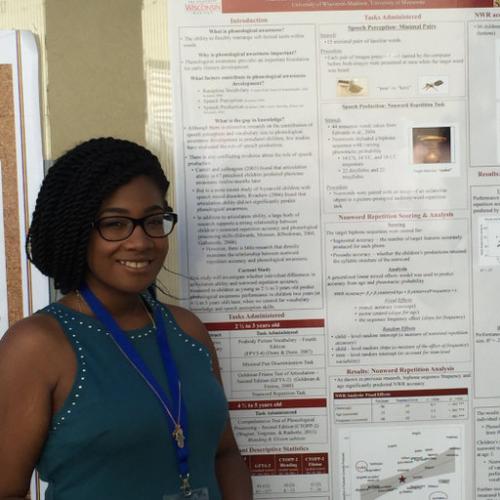Michelle Erskine will be defending her dissertation on December 15 from 1-2 PM. All are welcome to the public portion of the defense to hear her discuss her research!
The defense will be held in the Language Science Center (HJP 2123, across the hall from the LSC Hub). To join remotely, here is the zoom link. If you have difficulty joining the zoom, please contact Jan Edwards at edwards [at] umd.edu.
Speaker: Michelle Erskine
Title: Isolating effects of perceptual analysis and sociocultural context on children's comprehension of two dialects of English, African American English and General American English
Abstract:
There is a long-standing gap in literacy achievement between African American and European American students (e.g., NAEP, 2019, 2022). A large body of research has examined different factors that continue to reinforce performance differences across students. One variable that has been a long-term interest to sociolinguists and applied scientists is children’s use of different dialects in the classroom. Many African American students speak African American English (AAE), a rule-governed, but socially stigmatized, dialect of English that differs in phonology, morphosyntax, and pragmatics from General American English (GAE), the dialect of classroom instruction. Empirical research on dialect variation and literacy achievement has demonstrated that linguistic differences between dialects make it more difficult to learn to read (Buhler et al., 2018; Charity et al., 2004; Gatlin et al., 2015; Washington et al. 2018, inter alia) and recently, more difficult to comprehend spoken language (Byrd et al. 2022, Edwards et al., 2014; Erskine et al., 2022a; Johnson, 2005; de Villiers et al., 2007; JM Terry et al. 2010; JM Terry et al. 2022).
The prevailing explanation for these results has been the perceptual analysis hypothesis, a framework that asserts that linguistic differences across dialects creates challenges in mapping variable speech signals to listeners’ stored mental representations (Adank et al. 2009; Clopper, 2012; Clopper & Bradlow, 2008; Cristia et al. 2012). However, spoken language comprehension is more than perceptual analysis, requiring the integration of perceptual information with communicative intent and sociocultural information (speaker identity). To this end, it is proposed that the perceptual analysis hypothesis views dialect variation as another form of signal degradation. Simplifying dialect variation to a signal-mapping problem potentially limits our understanding of the contribution of dialect variation to spoken language comprehension. This dissertation proposes that research on spoken language comprehension should integrate frameworks that are more sensitive to the contributions of the sociocultural aspects of dialect variation, such as the role of linguistic and nonlinguistic cues that are associated with speakers of different dialects.
This dissertation includes four experiments that use the visual world paradigm to explore the effects of dialect variation on spoken language comprehension among children between the ages of 3;0 to 11;11 years old (years;months) from two linguistic communities, European American speakers of GAE and African American speakers with varying degrees of exposure to AAE and GAE. Chapter 2 (Erskine [2022a]) investigates the effects of dialect variation in auditory-only contexts in two spoken word recognition tasks that vary in linguistic complexity: a) word recognition in simple phrases and b) word recognition in sentences that vary in semantic predictability. Chapter 3 [Erskine (2022b)] examine the effects of visual and auditory speaker identity cues on dialect variation on literal semantic comprehension (i.e., word recognition in semantically facilitating sentences). Lastly, Chapter 4 [Erskine (2022c)] examines the effects of visual and auditory speaker identity cues on children’s comprehension of different dialects in a task that evaluates pragmatic inferencing (i.e., scalar implicature). Each of the studies investigate the validity of the perceptual analysis against sociolinguistcally informed hypotheses that account for the integration of linguistic and nonlinguistic speaker identity cues as adequate explanations for relationships that are observed between dialect variation and spoken language comprehension.
Collectively, these studies address the question of how dialect variation impacts spoken language comprehension. This dissertation provides evidence that traditional explanations that focus on perceptual costs are limited in their ability to account for correlations typically reported between spoken language comprehension and dialect use. Additionally, it shows that school-age children rapidly integrate linguistic and nonlinguistic socioindexical cues in ways that meaningfully guide their comprehension of different speakers. The implication of these findings and future research directions are also addressed within.



